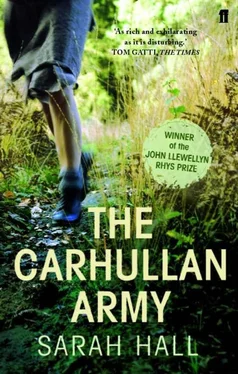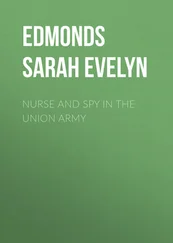Sarah Hall - The Carhullan Army
Здесь есть возможность читать онлайн «Sarah Hall - The Carhullan Army» весь текст электронной книги совершенно бесплатно (целиком полную версию без сокращений). В некоторых случаях можно слушать аудио, скачать через торрент в формате fb2 и присутствует краткое содержание. Год выпуска: 2008, Издательство: Faber and Faber, Жанр: Современная проза, на английском языке. Описание произведения, (предисловие) а так же отзывы посетителей доступны на портале библиотеки ЛибКат.
- Название:The Carhullan Army
- Автор:
- Издательство:Faber and Faber
- Жанр:
- Год:2008
- ISBN:нет данных
- Рейтинг книги:4 / 5. Голосов: 1
-
Избранное:Добавить в избранное
- Отзывы:
-
Ваша оценка:
- 80
- 1
- 2
- 3
- 4
- 5
The Carhullan Army: краткое содержание, описание и аннотация
Предлагаем к чтению аннотацию, описание, краткое содержание или предисловие (зависит от того, что написал сам автор книги «The Carhullan Army»). Если вы не нашли необходимую информацию о книге — напишите в комментариях, мы постараемся отыскать её.
The Carhullan Army — читать онлайн бесплатно полную книгу (весь текст) целиком
Ниже представлен текст книги, разбитый по страницам. Система сохранения места последней прочитанной страницы, позволяет с удобством читать онлайн бесплатно книгу «The Carhullan Army», без необходимости каждый раз заново искать на чём Вы остановились. Поставьте закладку, и сможете в любой момент перейти на страницу, на которой закончили чтение.
Интервал:
Закладка:
The others kept watch while I ghosted through the streets, leaving the wrappings at the doors of the occupied terrace quarters, in letterboxes, the cracks between bricks, and tied to the railings of the clinic; wherever people lived, wherever they suffered.
It was hard to know how well they would be received by the inhabitants of the combined residences; what, if anything, they would discern from a spray of ribboned foliage left at the foot of their homes. It was a strange rustic token that made little sense in the dark cobbled streets of the town, but its texture was like a warning, and its yellow bloom was somehow hopeful. There was no way to convey our true intent, no printed matter that we could distribute among the people. The gorse gave nothing away. It was simply a coded gift, a curious blossoming of colour in the wet unlit corridors.
I did not think of him often now, but when we passed through the street in which I had once been sectioned, I imagined Andrew sleeping upstairs in that room of huddled boxes, salvaged possessions, and consolidated existence. I did not know whether he would be alone or with someone else. I had been gone for a year and a half and it was doubtful that anything of mine would be left in the quarter. He was not a sentimental man. Most likely I had been reported and struck off, my remaining things examined by monitors and anything deemed useful removed. No one had come looking for me. For all I knew, I had disappeared utterly; perhaps I was even thought to be dead. Whatever my fate, Andrew no longer had a wife.
I pictured him picking up the corsage on the way to the refinery that morning, feeling the sharpness of it in his palm, and wondering about it, wondering what it meant. He would no doubt toss it back down on the step, leaving it for the other family to bring inside, or he would throw it onto one of the refuse piles at the end of the street. But he would hear that identical bundles had been found throughout the quarters. And he would realise, as many others would, that no gorse grew within the periphery of Rith, not even on the slopes of the Beacon Hill. It was a plant that flourished only in the uplands now, that had been brought in from the old Lakeland district. It was a message from without.
For two weeks we made night runs into town. We were not caught. We did not remain there long enough to witness the cuttings’ discovery, or reveal ourselves in the process of delivering them. Instead we went quickly to where the fell ponies were tethered and rode back along the mountain tracks to Carhullan. We never went to the same street twice. And we never gave any other indication of what was coming. As I worked, I knew that Jackie was not far away, making her count, timing the movements of the Authority.
The castle loomed above the town on the small hill opposite the Beacon, and within its barracks was the Authority’s headquarters, and the records of all those living within the official zones. Since the flooding of the Solway City it had become the central command post of the region. In the smaller Pennine towns there was a moderate Authority presence, enough monitors to maintain order, to oversee work details and the distribution of rations, but here lay the region’s main chamber of power. To strike it would be to sunder the chassis that held everything together. Jackie’s plan was not to hit and run, or to create havoc. She was planning a coup. We were going to hold Rith for as long as possible. Once word got out, once more ammunition had been taken, vehicles and supplies, then the other settlements would fall, she said. There would be mass uprising, a groundswell. The tide would turn against those who had abused their power for the last ten years. We would be the first place to declare independence, but others would follow. It was not about defending Carhullan any more; she was now fighting for the whole of the Northern territory.
As I walked through my hometown, remapping it in the darkness, my blood would slow and I would think about her vision and her courage. I would think of her standing in silhouette by the kitchen fireplace. We were on the cusp of a great moment in history, she had said, turning from the flames to face us. ‘We’ve become used to change always happening elsewhere, haven’t we? We’ve become used to waiting, hoping to be saved, hoping those in charge will reform and reform us. It’s the sickness of our breed. And it has become our national weakness. Sisters, no one is going to help us. There is only us. So why not here? Why not now?’ She had held a fist at her side, and white spittle had gathered on her lip. ‘Remember this as you go down there,’ she had urged us. ‘Revolutions always begin in mountain regions. It’s the fate of such places. Look around you. Look where you are. These are the disputed lands. They have never been settled. And those of us who live in them have never surrendered to anyone’s control. Nor will we ever.’
At night the heavy doors of the castle’s entrance were closed, opening only to let blue cruisers crawl in and out. Near the fortified walls, on the other side of the road, was Rith’s railway station. Once a week freight arrived, brought up from the ports to the South; shipments of food and medical supplies. The clinic lay half a mile away, in the shell of Rith’s elegant old hospital. And at the head of the town were the vast grey cylinders of the Uncon oil refinery. Everything was surveyed and marked out. Nothing would be left to chance.
On the last night of reconnaissance I stood in the streets and the rain hissed down around me. Litter blew along the gutters, empty containers, foils, and the little broken ampoules with silvery deposits inside. Faith cards lay rotting on the side of the road and rats scuttered along the filthy viaducts. I saw a thin dog slinking past the end of the terrace with a ragged grey scrap in its mouth. From inside a building I could hear the cries of a woman, and they went on and on, as if she could not stop, as if she were complicit in her own despair.
I had no love for the place. There was no residue of affection for the town in which I had been raised, and where I had seen out the country’s swift demise. I did not feel bad for its fate. I was not sorry for what would be my part in it. Everything had fallen too far. The people were oppressed, just as they had been hundreds of years before; they were the slaves of Megan’s imagining. The government had long ago failed them, and it would go on failing them. It was a place of desperation and despotism. Like the rest of the country, Rith was already a scene of ruin; nothing worse could have befallen it than its current state.
Once I had barely believed what I was living through. Now I believed deeply that the wrongs committed were tantamount, that the lives of the people within were worth saving and taking, that we had a duty to liberate society, to recreate it.
*
I was not among those who escorted the non-combatants off the farm. The original unit was issued that task. Over the course of two weeks that March small groups climbed into the back of the Land Rover and were taken down the fell, then on over to the Pennine towns. Jackie’s network was slim, but she seemed to trust those she had contact with inside the zones. Though they would not fight, the women had agreed to spread word of what she was doing, and attempt to raise local support for any action that might occur there later, after the operation in Rith.
The separation was more painful than I had thought it would be. Though the unit had become hardened in its conviction, and a line had been drawn through the community, there were friendships over a decade old being severed as the other women left. Watching them embrace and draw apart I wondered briefly if what we were doing was the right course after all; whether it would have been better for us all to remain in Carhullan and pray that we would be left alone, just as some of them had wanted. It felt as if we were sending them towards absolute danger, towards the terrible internment camps of the last century, though I knew it was us who would face the worst of it.
Читать дальшеИнтервал:
Закладка:
Похожие книги на «The Carhullan Army»
Представляем Вашему вниманию похожие книги на «The Carhullan Army» списком для выбора. Мы отобрали схожую по названию и смыслу литературу в надежде предоставить читателям больше вариантов отыскать новые, интересные, ещё непрочитанные произведения.
Обсуждение, отзывы о книге «The Carhullan Army» и просто собственные мнения читателей. Оставьте ваши комментарии, напишите, что Вы думаете о произведении, его смысле или главных героях. Укажите что конкретно понравилось, а что нет, и почему Вы так считаете.












